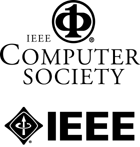24th IEEE |
International Performance Computing and Communications Conference |
|
|
IPCCC 2005 - April 7-9, 2005 - Phoenix, Arizona |
| ||||||
Keynote Speakers
|
Thursday, 8:15 to 9:15 amMohsen Guizani, "Status of Next Generation Cellular and Wireless Local Area Network Services and Current Research Activities"Abstract: With the rapidly growing demands for cellular/wireless communication systems, new types of user's applications are emerging. These applications of mixed traffic of voice, data, and real time audio/video have challenged the current Third Generation service providers to respond with new generation of system specifications capable of providing increased data throughput. The next generation cellular/wireless communication systems need not only to provide a higher data throughput but also to support integrated applications with various Quality of Service (QoS) requirements. Providing QoS control for the emerging Multimedia Wireless Generation (MWG) is a challenging task, due to the time varying and nonstationary wireless links. Being different from wired communication networks, providing QoS in the form of absolute guarantee may not be possible with current technologies.In this talk, we will review the current status of cellular/wireless systems in the US and point out its deficiencies. We then will suggest some solutions based on our current research activities at Western Michigan University Speaker Bio: Mohsen Guizani is currently a Professor and the Chair of the Computer Science Department at Western Michigan University. He received his B.S. (with distinction) and M.S. degrees in Electrical Engineering; M.S. and Ph.D. degrees in Computer Engineering in 1984, 1986, 1987, and 1990, respectively, from Syracuse University, Syracuse, New York. His research interests include Computer Networks, Wireless Communications and Computing, and Optical Networking. He currently serves on the editorial boards of six technical Journals and the Founder and EIC of "Wireless Communications and Mobile Computing" Journal published by John Wiley (http://www.interscience.wiley.com/jpages/1530-8669/). He is the author of four books and in the process of writing the fifth. He guest edited a number of special issues in Journals and Magazines including the Journal of Selected Areas in Communications and Communication Society Magazine. He also served as member, Chair, and General Chair of a number of conferences, including the General Chair of IEEE VTC. He has more than 140 publications in refereed journals and conferences. Dr. Guizani received both the Best Teaching Award and the Excellence in Research Award from the University of Missouri-Columbia in 1999. He won the best Research Award from KFUPM in 1995 (a university wide competition). He was selected as the Best Teaching Assistant for two consecutive years at Syracuse University, 1988 and 1989. He is currently serving as the "Distinguished Speaker" for the IEEE Computer Society. Dr. Guizani is an active senior member of IEEE, member of IEEE Communication Society, IEEE Computer Society, ASEE, ACM, OSA, SCS, and Tau Beta Pi. |
|
Friday, 8:15 to 9:15 amMike Coyle, "Future Combat Systems and Army Research Challenges"Abstract: The Future Combat Systems (FCS) is envisioned as a joint (across all the military services) networked system of systems that will enable levels of joint connectivity, situational awareness and understanding, and synchronized operations heretofore unachievable. FCS will operate as a System of Systems that will network existing systems, systems already under development, and systems to be developed to meet the requirements of the Army's Future Force Unit of Action. There are many scientific and technological challenges in developing and deploying such systems. Some of these challenges will be presented and discussed as well as the U.S. Army Research Office's role in addressing these challenges.The U.S. Army Research Office (ARO) mission is to seed scientific and far reaching technological discoveries that enhance Army capabilities. Basic research proposals from educational institutions, nonprofit organizations, and private industry are competitively selected and funded. ARO's research mission represents the most long-range Army view for changes in its technology and is the only Army organization that transcends all of its mission areas. Speaker Bio: Dr. Coyle is the U.S. Army Research Office (ARO) program manager for Discrete Mathematics and Computer Science. This program funds university research of importance and with direct applications to the Army in areas such as graph theory, computational geometry, computer graphics, immersive technologies, and theoretical computer science. Prior to ARO, he spent fifteen years at the Army's Benet Laboratories in Watervliet, NY working on various projects in the Applied Math. and Mechanics branch and the Modeling and Simulation branch. He received his Ph.D. in Mathematics (Numerical Analysis) from Rensselaer Polytechnic Institute.
|
|
Webpages from previous conferences: IPCCC 1998 IPCCC 1999 IPCCC 2000 IPCCC 2001 IPCCC 2002 IPCCC 2003 IPCCC 2004 |
|
| ||
| For questions, suggestions, or problems with the IPCCC website, please email the webmaster. |  |
 |